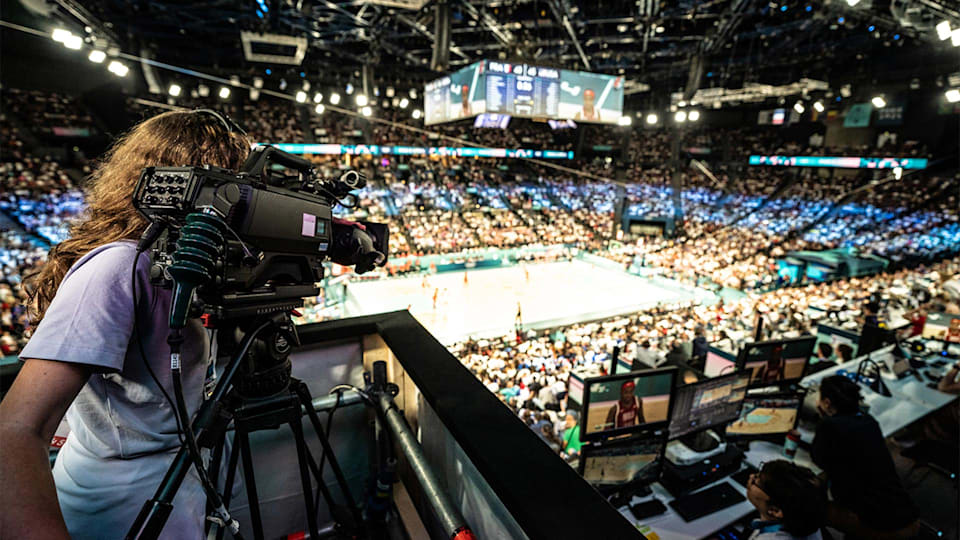Paris 2024: Over 24,000 media accreditations validated at the Olympic Games
Some 24,171 media representatives validated their accreditations for the Olympic Games Paris 2024, the International Olympic Committee (IOC) announced today.

Of these 24,171 accreditations, 5,733 were granted to written and photographic press, representing 2,113 accredited press organisations from 146 National Olympic Committees (NOCs). The remaining accreditations were allocated to 18,438 representatives from both the Media Rights-Holders (MRHs) and Olympic Broadcasting Services (OBS), the host broadcaster of the Games.
| Category press | Total |
| E (journalist) | 2,687 |
| Es (sport specific journalist) | 336 |
| EP (photographer) | 1,264 |
| EPs (sport specific photographer) | 277 |
| ET (technician) | 148 |
| Ec (MPC support staff) | 45 |
| ENR (non-rights holding broadcaster) | 460 |
| Ex (local journalist) | 58 |
| EPx (local photographer) | 37 |
| NOC E (press attaché) | 316 |
| Ex NOC Es (press attaché sport specific) | 105 |
| Total Press | 5,733 |
Looking at the gender split in the Press category, 23 per cent of journalists sent by media organisations were female and 77 per cent male. This is a slight increase in female representation, compared with the 20 per cent at Tokyo 2020.
The press category with the most female participation was the sport-specific press attachés from the NOCs, with 45 per cent female participation, followed by the NOC press attachés, with 39 per cent female participation.
The lowest percentage of female representation is still among photographers overall, with only 15 per cent of them women.
A positive example was Reuters, one of the IOC's Recognised Agencies. They reached a near-equal gender distribution amongst the photographer category, with 51 per cent male and 49 per cent female representation, and a 57 per cent male to 43 per cent female split among their contingent overall.
The gender breakdown for the press accreditation category is as follows:
| Category press | Female | Male | Total | Female % | Male % |
| E | 612 | 2,075 | 2,687 | 23 | 77 |
| Es | 90 | 246 | 336 | 27 | 73 |
| EP | 184 | 1,080 | 1,264 | 15 | 85 |
| EPs | 59 | 218 | 277 | 21 | 79 |
| ET | 25 | 123 | 148 | 17 | 83 |
| Ec | 11 | 34 | 45 | 24 | 76 |
| ENR | 133 | 327 | 460 | 29 | 71 |
| Ex | 14 | 44 | 58 | 24 | 76 |
| EPx | 6 | 31 | 37 | 16 | 84 |
| NOC E | 123 | 194 | 316 | 39 | 61 |
| Ex NOC Es | 46 | 58 | 105 | 45 | 55 |
| Total Press | 1,303 | 4,430 | 5,733 | 23 | 77 |
In the Broadcast category, the percentage of female representation among both MRHs and OBS increased as well, resulting in a 26 per cent female and 74 per cent male split.
| Category press | Female | Male | Total | Female % | Male % |
| HB (OBS) and RT (MRH) | 4,871 | 13,567 | 18,438 | 26,42 | 73,58 |
OBS took a number of initiatives to increase female representation in its team, and here are some highlights:
-
OBS hired more women than at previous Games for key broadcast operational roles, and increased the number of women in venue production teams, particularly in roles that generate images, to achieve more equal portrayal.
-
Two-thirds of the 42 OBS Broadcast Venue Managers and Deputy Broadcast Venue Managers were women (compared to 50/50 in Tokyo 2020), and two-thirds of the staff in the Broadcast Operations Centre at the International Broadcast Centre were women.
-
At Paris 2024, female commentators represented 37 per cent of the total number of OBS commentators, approximately double the number at Tokyo 2020.
Building on the IOC’s Portrayal Guidelines released earlier this year, OBS also launched several programmes aimed at training and hiring women for key roles within the host broadcast operation:
-
The Olympic Commentary Training programme is designed to equip former Olympians and Paralympians with practical commentary skills and increase the number of female commentators. At Paris 2024, 49 per cent of commentators were former Olympic and Paralympic athletes, and more than half of them were women. Fifteen of the commentary training participants were hired as freelance commentators for the Games, 12 of whom were women (80 per cent).
-
The “Framing the Future” initiative aims to increase the number of women working as camera operators. OBS established a camera training programme, training over 70 female camera operators in Paris in November 2023. The best trainees were offered freelance roles at Paris 2024, with 28 of them accepting these positions.
-
The OBS Broadcast Training Programme (BTP) provides local students with hands-on experience and insight into how the Olympic Games are broadcast. Of the selected students in the BTP programme, 57 per cent are women. There are over 1,300 paid Games-time BTP positions available.